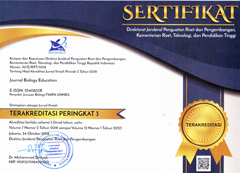ANALISIS MISKONSEPSI MATERI SISTEM REGULASI PADA SISWA KELAS XI SMA KOTA SEMARANG
Abstract
Penelitian ini bertujuan untuk mengetahui profil dan mengungkap fakta-fakta penyebab miskonsepsi pada materi sistem regulasi siswa kelas XI SMA Kota Semarang. Studi kasus dilakukan di 6 SMA Kota Semarang yang dipilih untuk mendapatkan data hasil tes identifikasi miskonsepsi materi sistem regulasi dengan metode Certainty of Response Index (CRI). Analisis data dilakukan secara kualitatif. Hasil penelitian menunjukkan bahwa siswa mengalami miskonsepsi materi sistem regulasi dengan kategori sedang (47,51%). Rata-rata siswa SMA kelompok atas, tengah, dan bawah mengalami miskonsepsi yang tinggi pada konsep fungsi sistem saraf, aplikasi sistem indera, dan fungsi sistem hormon. Penyebab miskonsepsi tersebut antara lain strategi pembelajaran guru kurang bermakna bagi siswa, sumber belajar yang kurang valid, dan cara belajar yang cenderung menghafal.
This study was aimed to know the profile and explore he root of misconception at regulation system topic of grade XI students in Semarang. Case-study was done on 6 selected High Schools in Semarang to get the misconception test result on regulation systems topic by Certainty of Response Index (CRI) methods. Data was analyzed by qualitative methods. The findings showed that student had misconception at regulation system topic on medium category (47,51%). Students on the top, middle, and below group had misconception on the concept of nervous system function, the application of five senses systems, and the function of hormonal systems. The misconceptions was caused by less meaningful learning, less valid of learning resources, and the method of study which tended to use memorizing.
The copyright of the article once it is accepted for publication shall be assigned to the journal as the publisher. The intended copyright includes the right to publish the article in various forms (including reprints). The journal maintains the publishing rights to the published articles.
This work is licensed under a Creative Commons Attribution 4.0 International License.







